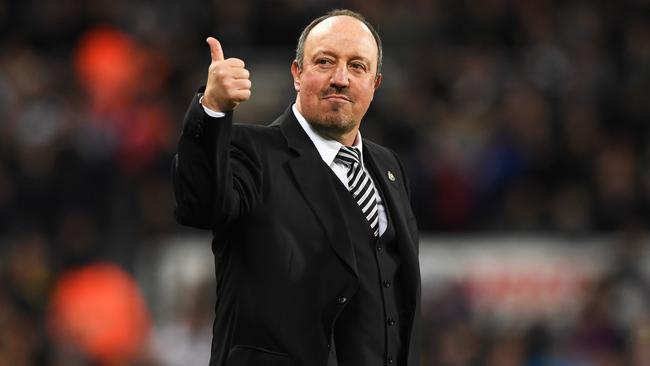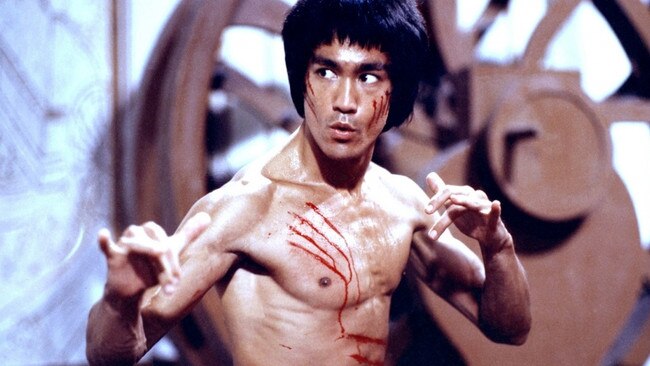Rafa Benitez the perfect man for Newcastle’s relegation fight
Newcastle United have the perfect man for a relegation scrap in Rafa Benitez.

Rafa Benitez is choking me. His forearm is pressed against my windpipe, his other hand gripping the scruff of my neck.
“My moves are not as good as they were, but I can fight if I have to fight,” the Newcastle United manager hisses. “I’m ready. I’ve done it all my life.”
Benitez looks ferocious. His eyes are blazing. And this interview has veered wildly off course.
We are not far from Alicante in Spain, at La Finca Golf & Spa Resort, where the Newcastle squad are training. They came here last year for a bit of sun, a bit of difference, when Benitez spoke about “suffering” in his job, but it obviously did the trick because three victories in succession lifted the threat of relegation.
That threat lurks again — Newcastle, who are 16th in the Premier League, are at home to Huddersfield Town tomorrow morning (AEDT) — and Benitez, 58, is suffering again, although not as much as me. We are standing in a glassy reception area, sizing each other up. He is older than me and smaller, but less hapless. Less terrified.
This is what happens when you ask the most meticulous of managers, this Champions League winner, if there is anything in his life aside from football, his great obsession. It turns out there is — quite a lot — but if he is in, he is all-in, which is why he is demonstrating his prowess at martial arts. Even unplugged, Benitez is intense.
“I loved characters like Bruce Lee and I did judo from the age of six to 13,” Benitez says, which is when he beckons me to get up. “At 13, I had made it to brown belt, then I gave up to join the Real Madrid academy. Three years later, my brother was doing the judo black-belt exam, so I did it, too.
“You had to compete in five fights and win three to get the belt. But they killed me because I no longer had the power in my arms.”
He grabs me. “The main thing is you have to hold all the time so if you don’t practise, after three or four fights you have no power left.” His last scrap, he says, was “when I was a kid at school”. Relief washes through me. I cough and breathe.

Power in his arm? Benitez’s right wrist is strapped up. He suffers from repetitive strain injury, which is often brought on by shaking hands (which he does a lot), and using his laptop (ditto, scouting players and teams). He wears his commitment on his sleeve although, on this occasion, sympathy is misplaced.
“It’s not just that I was working hard, I was also on the phone, competing against my wife,” he says. “She was playing Solitaire, so I wanted to beat her. She was doing very well and she showed me her score. I asked: ‘What is the record?’ I spent one month on that game. But believe me, I beat the record.”
As anyone who knows Benitez intimately would say; of course he did. Whatever he does, he is driven. “In our quieter moments, I play cards with my staff, the Spanish game Mus,” he says. “I enjoy that a lot, playing and competing.”
To switch off from football, Benitez switches on. He has previously detailed his love of traditional British sitcoms — Only Fools and Horses, Father Ted — but he is also a fan of celluloid. “If I want to relax, I like to watch films about cowboys,” he says. “I read many novels about the Wild West. I like action.
“You have that TV channel, TMC, and sometimes they have movies about cowboys. I like Clint Eastwood a lot. A lot of the spaghetti westerns were filmed in Almeria, here in Spain, because it’s like a desert. Those films are not so good, because you can see the Indians still wearing their wristwatches, the telephone cables in the background.” Trust him to notice.
Not that Benitez is the master of the TV remote when he is at home on Merseyside, where Montse, his wife, and his two daughters, Claudia, 20, and Agata, 16, are based. “It’s a problem,” he says. “One of them is watching Geordie Shore. They love all that, Big Brother, Love Island, all that rubbish. I can’t win.”
Benitez pulls out his phone; his initials are printed on the case and his screensaver is a picture of his three dogs. He has just received a message from Agata. “She is telling me about Instagram, saying, ‘You don’t have a clue, put this and you’ll get more followers.’
“I don’t need more followers, but for her it seems important. She gives me advice. She tells me I have to follow certain people because they’re Newcastle fans. Alan Shearer was easy. Ant and Dec (TV presenters Anthony McPartlin and Declan Donnelly) were easy, too. She told me, ‘James Bay is a famous singer but he’s also a massive Newcastle fan and he says nice things about you, so follow him’. I did.”
Agata also provides tactical analysis. “Do you know the comic books about Asterix and Obelix?” Benitez asks. “The Roman soldiers use the tortoise formation, with shields covering the front, sides and top. She tells me Newcastle should do the same, with the ball in the middle, going forward and then attacking.”
These conversations keep Benitez young, engaged. “The way you talk with your daughter, you know how she’s thinking and it is very useful,” he says. “Players are like teenagers, many of them. You have to think, ‘What would I say to my daughters in this situation? How would I communicate?’. It can be similar, managing your daughters and players.”
Dogs have always had a prominent role in his existence. “The German shepherd is called Red, one is Goofy, a springer spaniel, and then Clem, the labrador,” Benitez says. “Goofy is my wife’s dog. He’s the boss. I try to speak to them in Spanish and English, but they don’t understand.
“I have had dogs all my life. We used to train them for competitions. I had a doberman when I was 26, 28, and he was the grandson of a champion dog in the United States. I was living on the fourth floor and I’d have to take him for a pee and he’d be pulling me down the stairs. He was very fast, very strong. He died of cancer of the brain when he was three. We had a white alsatian, which lived for 14 years. A lot of my family — my sister, my brother, my two uncles — are vets. We have always had dogs and animals around.”
Might Benitez have been a vet, too? “No, it was football, football, football, sport,” he says. “I was doing football, handball, judo, swimming and athletics, everything. I was in all the teams. During the summer from the age of two until 22, I was outside with my friends, playing football, running, throwing stones in the river.”
Benitez is a garlanded manager — La Liga and the UEFA Cup with Valencia, the FA Cup and Champions League at Liverpool, the Europa League with Chelsea and the Italian cups at Napoli — but what about as a player?
“My best position was sweeper,” he says. “I could see the game and I could talk. I was not the quickest over short distances but I had vision and technically I was fine.
“But I did not have the level to be a Real Madrid player. I was someone who could understand the game but I was not a star.”
After playing in Spain’s lower tiers, a knee injury meant retirement at 26.
At Newcastle, his challenge has been different; promotion from the Sky Bet Championship, safety, consolidation. Tyneside has celebrated no meaningful silverware for 50 years and its club can be dysfunctional, which does not mean that Benitez’s outlook has altered. He is out of contract this summer and, for him to stay, something must change; it is unlikely to be him.
“I want to win every game, so of course I still want to win trophies,” he says. “I don’t like to play against any manager and not have the chance to compete, that is crucial. The main thing is the players, they can make the difference. But you have to be ambitious.”
Benitez is, at everything he does, whether work or fun. Trust me, there are bruises to prove it.


